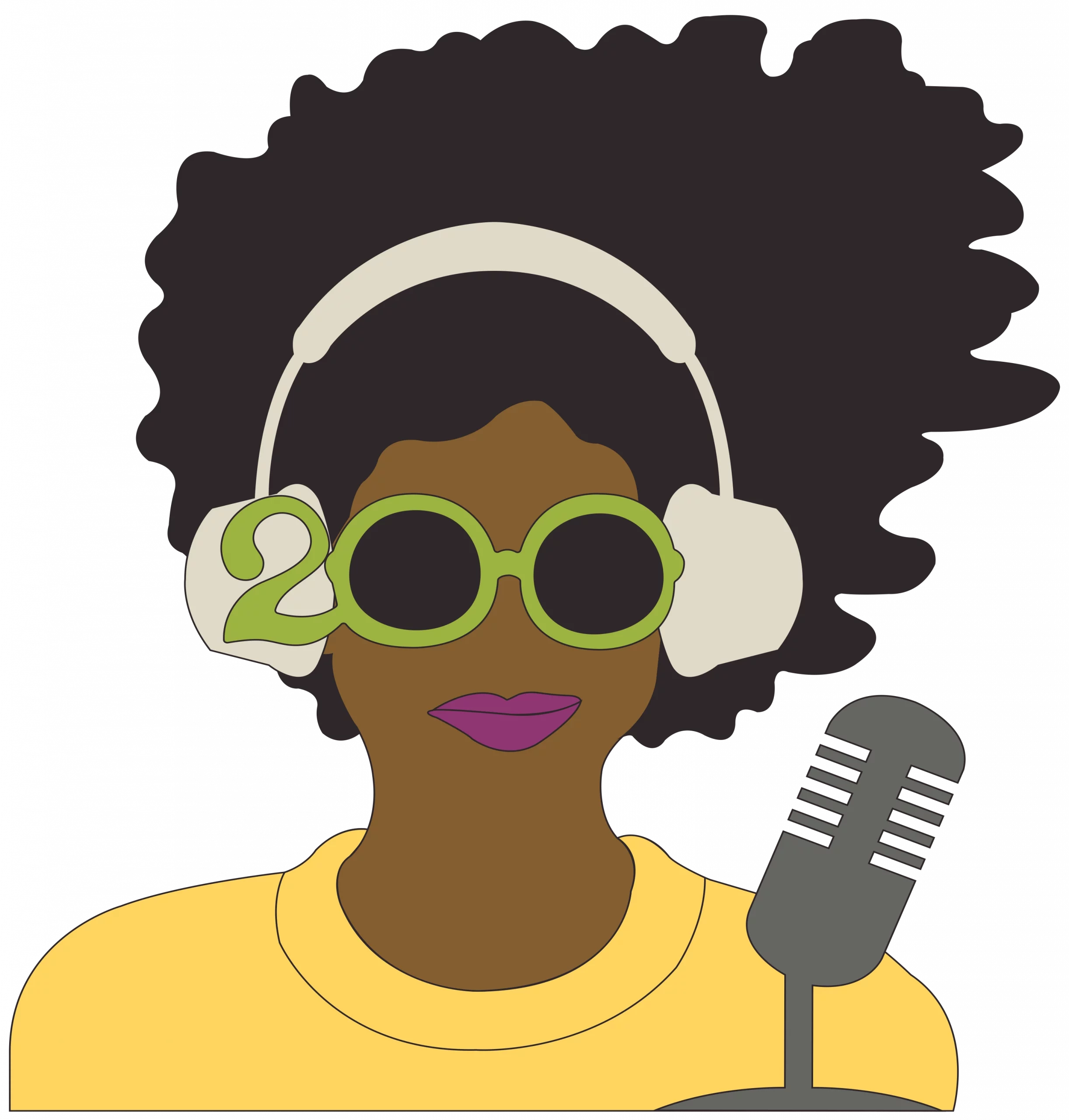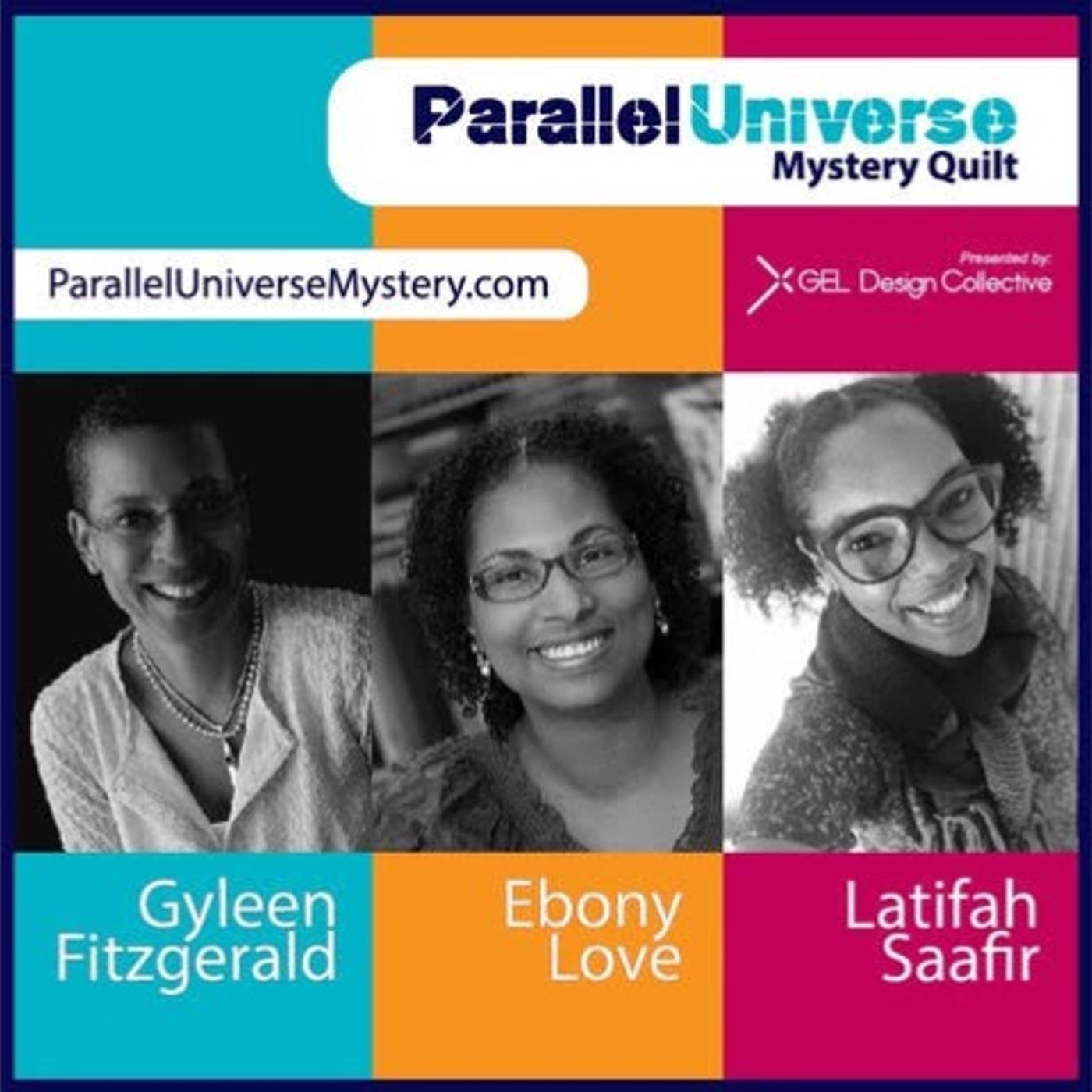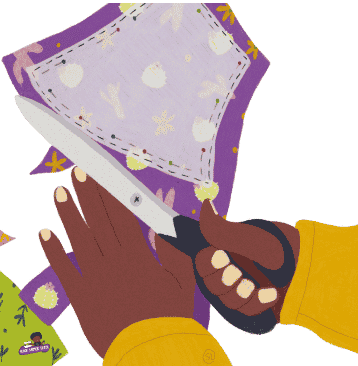[00:00:00] Lisa W.: Hello Stitchers. Welcome to Stitch Please. The official podcast of Black Women Stitch, the sewing group, where Black lives matter. I'm your host, Lisa Woolfork. I'm a fourth generation sewing enthusiast with more than 20 years of sewing experience. I am looking forward to today's conversation. So sit back, relax, and get ready to get your stitch together.
[00:00:26] Welcome to the Stitch Please podcast. I'm your host. Lisa Woolfork. And as I say every week, this is a very special episode because this episode, I am gonna talk with you about a road trip that I recently took. And ended up including some really fun sewing excursions in particular, a visit to meet a person in real life who I had only talked to before on the internet or, other like digital conversations. So I'm realizing that one of the differences between having little kids and having adult kids is that you can leave adult kids home alone. And so my spouse and I were able to visit family in upstate New York. And we are located in Virginia, Charlottesville, Virginia.
[00:01:19] So the place we were going to visit was about. It was exactly 368 miles from where we are. I should also add that I do not like road trips at all. I think I have like maybe a three hour max of, and then I get like really cranky or despondent. So an eight hour drive or seven and a half, depending, like if you left early in the day, it was like seven and a half hours.
[00:01:55] And if you left later in the day, it'd be closer to eight and a half because of traffic. And so we were heading on to do this road trip heading north from Virginia to upstate New York. And my thought was, how can I make this be less arduous? Emotionally, and my spouse is incredibly wonderful and was like maybe there's a fabric store.
[00:02:24] And I was like, there is a fabric store there
[00:02:28] is absolutely a fabric store there's fabric store that I really wanna go see. And it is cultured expressions in Rahway, New Jersey. And I looked at the three different routes that the, that Google or Waze, or one of the mapping apps had suggested they suggest the main route.
[00:02:50] And then they set suggest alternate routes. But the main route, which was the faster route was also the route that was closer to Rahway, New Jersey. The other ones had us going west on the west end of Pennsylvania, rather than on the east end, closer to Philadelphia and the Atlantic ocean and all those states on that side, including New Jersey.
[00:03:14] I was very excited and if you are a Patreon subscriber, I will upload a video of a tour that I took of the shop. It was a lot of fun. To begin when we arrived in Rahway, it was about 101 degrees. It was really hot and Rahway is a beautiful and quaint little town. It's got a post office in library and fire station and all along this main street. And when we walked in, Lisa was so kind. She was like, Hey, do you want some water or some mango juice?
[00:03:53] And it was, the answer was yes. And thank you. It was just so welcoming. It just felt like coming home in a way or visiting a cousin that you hadn't seen in a long time, except that I had talked with Lisa. earlier in 2022. And she's been on the podcast a couple of times, and I will be sure to include links to her episodes.
[00:04:15] One was talking about her in the shop and running a brick and mortar store. And the other one was about her. Conference that she held talking about African fabrics and it was really wonderful. And I did a panel talking about African quilts with a few other quilt artists. And so she's really a wonderful organizer and a, just an extraordinary light in the sewing community.
[00:04:42] She offers a grant for those who have African fabric businesses just to offer support and mentorship and resourcing and just really cool peeps. As I said, she offered us water and mango juice, and I was like, oh, this is so nice. And I did spend a good deal of time at the shop speaking in a very high falsetto because I was marveling at every little thing that I happened to see.
[00:05:08] But one of the things that I was very excited about was the opportunity to enhance the sewing project that I had planned to work on during the vacation we were driving again, as I said earlier, to upstate New York to the Catskills. And my, I did bring my little tiny travel machine because I wanted to work on a shirt for my sister.
[00:05:32] She had been asking about this for some time and I thought this could be a good opportunity to piece together. All of the elements that I needed. To create the base fabric. She want, she saw a fabric. She saw a shirt on Good Times, the show, Good Times. She sent me a screenshot of it. And it's like a kind of hybridized non-linear form of quilting. That is lots of different patches and types and textures of fabric is really quite beautiful. I'm working on that. I had a few quilt blocks.
[00:06:06] I had some applique blocks and I this would be really cool to supplement it with some of the fabric that Lisa has, because it's absolutely brilliant. And so what I ended up getting was two jelly rolls for those unfamiliar, with quilting terms, a jelly roll is a stack of strips that are cut from salvage to salvage from
[00:06:35] the jelly rolls allow for a variety of different fabrics. To be put together. It's almost like it's already curated. When you choose a jelly roll, you know that the fabrics are gonna go together. They might come from, they might all come from the same designer. They might come from a similar color way or one that's even deliberately different.
[00:07:01] But when you get a jelly roll, you're grabbing. Something that you know, is going to work because it's been curated and organized to work together. A jelly roll is a stack of between, depending on the vendor between 30 strips and 50 strips. Lisa's are 50 strips. Related to jelly rolls are layer cakes, and these are.
[00:07:30] Squares of fabrics, either five inch squares, 10 inch squares, sometimes 12 inch squares of fabric under the same principle meant to be a variety of fabrics that go together and are offered as a single unit. Jelly roll are efficient pieces of fabric. I love a good jelly roll and Lisa's jelly rolls at cultured expressions are very good jelly rolls.
[00:08:01] I don't think there was any repeats in any of the. Of the two different sets of jelly rolls that I purchased. I got one that was 50 different strips that were one and a half inch wide. And I got another set that was also 50 strips, but two and a half inch wide. And then there was a bundle of strips that were less than.
[00:08:27] An inch. So some were an inch, some were half an inch. Some were maybe a scant one and a half, like one and a half at one point, but then tapered down. These odd shapes were perfect for what I was thinking of doing, which is called string piecing and similar to foundation piecing.
[00:08:47] But what you're doing instead is connecting the strips of fabric one to the other, not putting them on a foundation, but just stringing them together. That's how I understand what string piecing is or string quilting. And so my thought was to take the two and a half inch fabric strips and put them alongside the one and a half inch strips make.
[00:09:12] Make a several chunks of these strip sets and then cut them and then attach them to some of the other quilt blocks and pieces that I had. So I was so excited to see Lisa's shop and to grab these because. I did not have any other fabric in mind for making these garments. I had the quilt blocks. I had the larger applicated hand blocks, both of which I got at at an estate sale.
[00:09:44] I'd planned to update them with some denim quilt blocks that I had. The making some new quilt blocks and the ankara works perfectly in this scenario. The ankara fabric really did help. It brought out a lot of the color from the traditional quilt blocks that I had while also.
[00:10:05] Standing out in nice relief to the denims that were used. Looking at the denim and the natural fibers of the denim, comparing that to the cottons that they ankara fabrics have. It just felt oh, this is so cool. African and denim and cotton, it's a really beautiful color combination to bring together. Ankara fabric and denim, and I think denim matches with anything or coordinates with anything is such a great neutral and the multiple textures and colors of the, ankara strips. Even in their very small size, even at just two and a half inches, you.
[00:10:44] It packs such vibrancy in the final piece. So what I was able to do was to make these strip sets and then attach them to the quilt pieces that I already had. So that's what, that was my plan. I was so happy to visit cultured expressions and to get those materials and the things that I needed. And while I was there, I was able to learn about the retreat that Lisa is having it is. She calls her retreat. S E W J O U R N S. And this next one that's coming up in October is going to be in the Philadelphia area.
[00:11:21] And she talked about some of the benefits of the retreat and some of the things that are gonna be happening. So here's a little short clip about that right now.
[00:11:34] Okay. So here at Cultured Expressions, it's amazing here with Lisa who is fantastic. She's been on the podcast a couple times. I have, we've had a great time and she is a great time and she has a retreat coming up. And is it New Mexico?
[00:11:50] Lisa S.: No, this one's in outside of Philly is the east coast. So east coast during the week. So it would change it up a little bit for this one. Okay. So it's gonna be just a retreat experience and guest speakers, time to work on your own stuff. Retail therapy, gourmet food. We're gonna be at Normandy farm. And the food is wonderful. The head chef is from Kenya. Oh, my word. Y'all it's gonna, it's gonna be some good food that alone, right? some good food, some good wine, some good times. Some sewing and some retail. Yes. All to the good.
[00:12:21] Lisa W.: And the reason I thought it was in New Mexico, cuz Lisa was taking people everywhere. I know you would go
[00:12:26] Lisa S.: probably next year. Santa Fe would come back. Yes. Santa Fe was something.
[00:12:30] Lisa W.: And didn't you do one on the continent as well? Did you have one?
[00:12:33] Lisa S.: We did a couple. Sewjourns to Ghana. I don't know if I'm doing that anytime soon. There's a lot going on, but if I can, I'm gonna gradually get back to within the U.S.. And this is a perfect way to do it. Like Philly's like I got that. I wanna do in driving distance for me. To be honest, it needs just to ease in, yeah, absolutely. Cause it's a lot of work. It's a lot of work and you give a lot of your provide.
A lot of people are going to Sewjourns out west are actually east coast people.
[00:13:00] Lisa W.: Oh my word. This is amazing.
So if you're interested in gourmet food and wine and an amazing time with wonderful speakers, Lisa Shepherd Stewart is offering a fantastic Sewjourn right outside of Philadelphia. Find out more @culturedexpressions.com. You can call her at one eight sixty six mud cloth.
[00:13:21] And if you are in. I think they call it the tri-state area. If you are near New Jersey, you can go to her shop in raw, and it's actually really close to the train. Like you take the Amtrak and then you can get on this other train and it lets you off like a block from the shop.
This is just a little short report on a road trip that I recently took and had a wonderful time at Cultured Expressions. If you do have a chance to visit the shop, I highly urge you to do, but if you can't visit in person, you can totally connect with Lisa for a virtual visit. She started doing the virtual visits in 2018 and they started to kick up and gain more popularity with the rise of social distancing and the need for online shopping.
[00:14:13] She does a wonderful job of walking you through so much that she has in the shop. And I am loving my jelly rolls. I have not sewn all this trip. I didn't need all of them just for this one garment, but I'm really glad to have maybe about 50 left, so I'm ready for the next project.
[00:14:35] So that was the story of a road trip that was made even better by a wonderful fabric detour to Cultured Expressions in raw New Jersey. It was my first time meeting, Lisa Shepard Stewart in person after talking with her online and having her on the podcast a couple times and supporting her. Fantastic. African fabrics event last year and it was a wonderful time.
[00:15:05] And so I'm just encouraging folks. If you haven't connected with Lisa yet, please do she's a lot of fun. She's got amazing fabrics. And if you are up for travel, she is hosting a fantastic retreat in Philadelphia or outside of Philadelphia in October. So catch up with her about.
[00:15:23] You've been listening to the Stitch Please podcast the official podcast of Black Women Stitch, the sewing group where Black lives matter. We appreciate you supporting us by listening to the podcast. If you'd like to reach out with, to us with questions, you can contact us at Blackwomenstitch@gmail.com.
If you'd like to support us financially, you can do that by supporting us on Patreon, P AT R E O N. And you can find Black Women Sitch there in the Patreon directory. And for as little as $2 a month, you can help support the project with things like editing transcripts and other things to strengthen the podcast.
And finally, if financial support is not something you can do right now, you can really help the podcast by rating it and reviewing it. Anywhere you listen to podcasts that allows you to review them. So I know that not all podcast directories or services allow for reviews, but for those who do for those that have a star rating, or just ask for a few comments, if you could share those comments and say nice things about us at the Stitch Please podcast, that is incredibly helpful.
Thank you so much. Come back next week and we'll help you get your stitch together.



